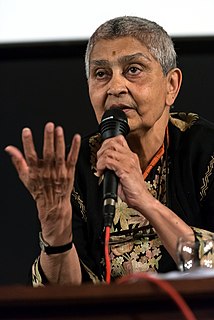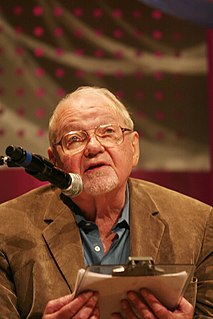Related Research Articles

Literary theory is the systematic study of the nature of literature and of the methods for literary analysis. Since the 19th century, literary scholarship includes literary theory and considerations of intellectual history, moral philosophy, social prophecy, and interdisciplinary themes relevant to how people interpret meaning. In the humanities in modern academia, the latter style of literary scholarship is a development of critical theory. Consequently, the word theory became an umbrella term for scholarly approaches to reading texts, some of which are informed by strands of sociology and continental philosophy.

Literary criticism is the study, evaluation, and interpretation of literature. Modern literary criticism is often influenced by literary theory, which is the philosophical discussion of literature's goals and methods. Though the two activities are closely related, literary critics are not always, and have not always been, theorists.
Stanley Eugene Fish is an American literary theorist, legal scholar, author and public intellectual. He is currently the Floersheimer Distinguished Visiting Professor of Law at Yeshiva University's Benjamin N. Cardozo School of Law in New York City, although Fish has no degrees or training in law. Fish has previously served as the Davidson-Kahn Distinguished University Professor of Humanities and a professor of law at Florida International University and is dean emeritus of the College of Liberal Arts and Sciences at the University of Illinois at Chicago.

Gayatri Chakravorty Spivak is an Indian scholar, literary theorist, and feminist critic. She is a University Professor at Columbia University and a founding member of the establishment's Institute for Comparative Literature and Society.

Fredric Jameson is an American literary critic, philosopher and Marxist political theorist. He is best known for his analysis of contemporary cultural trends, particularly his analysis of postmodernity and capitalism. Jameson's best-known books include Postmodernism, or, The Cultural Logic of Late Capitalism (1991) and The Political Unconscious (1981).

Terence Francis Eagleton is a British literary theorist, critic, and public intellectual. He is currently Distinguished Professor of English Literature at Lancaster University.

Marxist aesthetics is a theory of aesthetics based on, or derived from, the theories of Karl Marx. It involves a dialectical and materialist, or dialectical materialist, approach to the application of Marxism to the cultural sphere, specifically areas related to taste such as art, beauty, and so forth. Marxists believe that economic and social conditions, and especially the class relations that derive from them, affect every aspect of an individual's life, from religious beliefs to legal systems to cultural frameworks. From one classic Marxist point of view, the role of art is not only to represent such conditions truthfully, but also to seek to improve them ; however, this is a contentious interpretation of the limited but significant writing by Marx and Engels on art and especially on aesthetics. For instance, Nikolay Chernyshevsky, who greatly influenced the art of the early Soviet Union, followed the secular humanism of Ludwig Feuerbach more than he followed Marx.
David Norbrook was Merton Professor of English literature at Oxford University from 2002 to 2014, and is a now an Emeritus Fellow of Merton College, Oxford. He specializes in literature, politics and historiography in the early modern period, and in early modern women's writing. He is currently writing a biography and edition of Lucy Hutchinson. He teaches in literary theory and early modern texts, in early modern women writers, and in Shakespeare, Milton and Marvell. Before his current role, he taught at the University of Maryland.
The academic discipline of women's writing as a discrete area of literary studies which is based on the notion that the experience of women, historically, has been shaped by their gender, and so women writers by definition are a group worthy of separate study: "Their texts emerge from and intervene in conditions usually very different from those which produced most writing by men." It is not a question of the subject matter or political stance of a particular author, but of her gender, i.e. her position as a woman within the literary world. Women's writing, as a discrete area of literary studies and practice, is recognized explicitly by the numbers of dedicated journals, organizations, awards, and conferences which focus mainly or exclusively on texts produced by women. Women's writing as an area of study has been developing since the 1970s. The majority of English and American literature programs offer courses on specific aspects of literature by women, and women's writing is generally considered an area of specialization in its own right.
Andrew John Milner is a British-Australian cultural theorist and literary critic, Professor Emeritus of English and Comparative Literature at Monash University and Honorary Professor of English and Comparative Literary Studies at the University of Warwick. In 2013 he was Ludwig Hirschfeld Mack Visiting Professor of Australian Studies at the Institut für Englische Philologie, Freie Universität Berlin.

The sociology of literature is a subfield of the sociology of culture. It studies the social production of literature and its social implications. A notable example is Pierre Bourdieu's 1992 Les Règles de L'Art: Genèse et Structure du Champ Littéraire, translated by Susan Emanuel as Rules of Art: Genesis and Structure of the Literary Field (1996).
Lee Edelman is an American literary critic and academic. He serves as a professor of English at Tufts University. He is the author of three books.

News from Nowhere was the journal of Oxford English Limited (OEL), a left-wing group of students and dons who sought progressive reforms to the Oxford University English Faculty syllabus between 1982 and 1992. News from Nowhere was created and edited by Tony Pinkney and ran for nine issues from 1986 to 1991.

In literary theory, a text is any object that can be "read", whether this object is a work of literature, a street sign, an arrangement of buildings on a city block, or styles of clothing. It is a coherent set of signs that transmits some kind of informative message. This set of signs is considered in terms of the informative message's content, rather than in terms of its physical form or the medium in which it is represented.
The Unit for Criticism and Interpretive Theory is an interdisciplinary program developed within the Graduate College and the College of Liberal Arts and Sciences at the University of Illinois at Urbana-Champaign. It works to promote conversations among a range of departments in the humanities, social sciences, and performing arts by organizing lectures, panel discussions, and conferences, as well as a yearly series of lectures on Modern Critical Theory. The Unit is one of several dozen centers around the world devoted to critical theory, and was one of the first to be formally established.
Ken Hirschkop teaches in the English Department at the University of Waterloo, Ontario, Canada.
Cultural studies is a field of theoretically, politically, and empirically engaged cultural analysis that concentrates upon the political dynamics of contemporary culture, its historical foundations, defining traits, conflicts, and contingencies. Cultural studies researchers generally investigate how cultural practices relate to wider systems of power associated with or operating through social phenomena, such as ideology, class structures, national formations, ethnicity, sexual orientation, gender, and generation. Cultural studies views cultures not as fixed, bounded, stable, and discrete entities, but rather as constantly interacting and changing sets of practices and processes. The field of cultural studies encompasses a range of theoretical and methodological perspectives and practices. Although distinct from the discipline of cultural anthropology and the interdisciplinary field of ethnic studies, cultural studies draws upon and has contributed to each of these fields.

Marxism was introduced by Karl Marx. Most Marxist critics, who were writing in what could chronologically be specified as the early period of Marxist literary criticism, subscribed to what has come to be called "Vulgar Marxism." In this thinking of the structure of societies, literary texts are one register of the superstructure, which is determined by the economic base of any given society. Therefore, literary texts are a reflection of the economic base rather than "the social institutions from which they originate" for all social institutions, or, more precisely human–social relationships, are in the final analysis determined by the economic base. According to Marxists, even literature itself is a social institution and has a specific ideological function, based on the background and ideology of the author. The English literary critic and cultural theorist Terry Eagleton defines Marxist criticism this way:
Marxist criticism is not merely a 'sociology of literature', concerned with how novels get published and whether they mention the working class. Its aim is to explain the literary work more fully; and this means a sensitive attention to its forms, styles and, meanings. But it also means grasping those forms, styles and meanings as the product of a particular history.
Does the text serve to perpetuate the ruling class ideology; to subvert that ideology, such as William Morris's News from Nowhere; or to signify both a perpetuation and subversion of the dominant ideology, such as in the works of Charles Dickens with Hard Times being the novel that most openly textualizes such a double signification as it offers a damning criticism of capitalism while at the same time seeking a perpetuation of a class-structured society.
Carolyn Dinshaw is an American academic and author, who has specialised in issues of gender and sexuality in the medieval context.

Sally Ledger was a Professor of Victorian literature who made major contributions to the fields of nineteenth-century women’s writing, literary feminism, and the study of Charles Dickens.
References
- ↑ Eagleton, Terry (1990). The Significance of Theory . Oxford: Basil Blackwell. pp. 81. ISBN 0-631-17271-8.CS1 maint: discouraged parameter (link)
- ↑ Richards, Bernard (1986). "F.W. Bateson and Oxford English Limited". The Oxford Magazine (Eighth week, Trinity term): 9–10.
- ↑ Guy and Small (1993). Politics and Value in English Studies. Cambridge University Press. p. 20.
- ↑ Milner (2002). Re-Imagining Cultural Studies. Sage Publications. pp. 136–7.